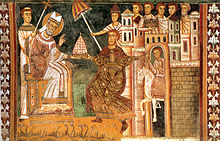| Millennium: | 1st millennium |
|---|---|
| Centuries: | |
| Decades: | |
| Years: |
| 328 by topic |
|---|
| Leaders |
| Categories |
| Gregorian calendar | 328 CCCXXVIII |
| Ab urbe condita | 1081 |
| Assyrian calendar | 5078 |
| Balinese saka calendar | 249–250 |
| Bengali calendar | −265 |
| Berber calendar | 1278 |
| Buddhist calendar | 872 |
| Burmese calendar | −310 |
| Byzantine calendar | 5836–5837 |
| Chinese calendar | 丁亥年 (Fire Pig) 3025 or 2818 — to — 戊子年 (Earth Rat) 3026 or 2819 |
| Coptic calendar | 44–45 |
| Discordian calendar | 1494 |
| Ethiopian calendar | 320–321 |
| Hebrew calendar | 4088–4089 |
| Hindu calendars | |
| - Vikram Samvat | 384–385 |
| - Shaka Samvat | 249–250 |
| - Kali Yuga | 3428–3429 |
| Holocene calendar | 10328 |
| Iranian calendar | 294 BP – 293 BP |
| Islamic calendar | 303 BH – 302 BH |
| Javanese calendar | 209–210 |
| Julian calendar | 328 CCCXXVIII |
| Korean calendar | 2661 |
| Minguo calendar | 1584 before ROC 民前1584年 |
| Nanakshahi calendar | −1140 |
| Seleucid era | 639/640 AG |
| Thai solar calendar | 870–871 |
| Tibetan calendar | 阴火猪年 (female Fire-Pig) 454 or 73 or −699 — to — 阳土鼠年 (male Earth-Rat) 455 or 74 or −698 |

Year 328 (CCCXXVIII) was a leap year starting on Monday (link will display the full calendar) of the Julian calendar. At the time, it was known as the Year of the Consulship of Ianuarinus and Iustus (or, less frequently, year 1081 Ab urbe condita). The denomination 328 for this year has been used since the early medieval period, when the Anno Domini calendar era became the prevalent method in Europe for naming years.